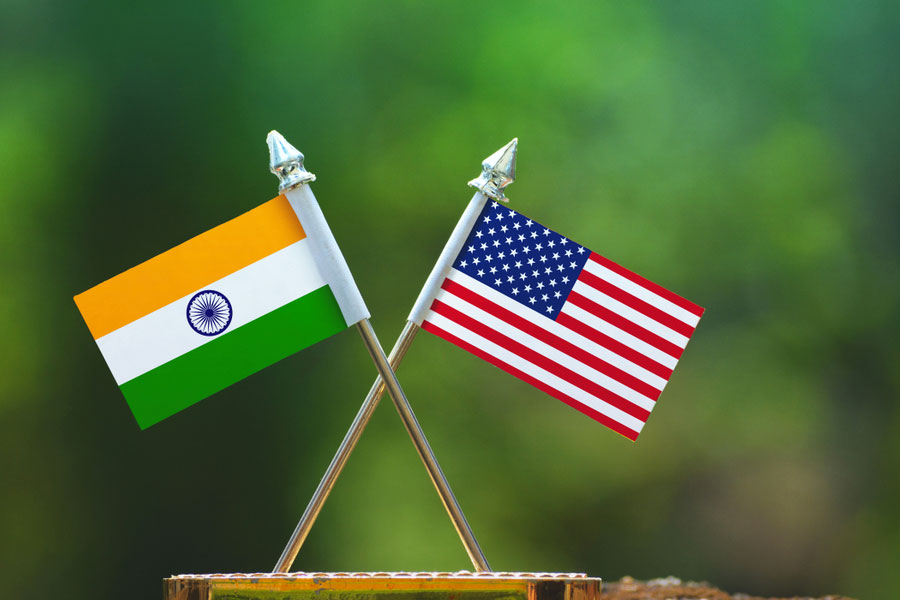The 2+2 ministerial dialogue between India and the US in New Delhi this week carries the promise of deepening a robust partnership between the two nations, particularly in the defense area, according to an expert.
Coming in the backdrop of a complex and ever-evolving global landscape, the dialogue will serve as a platform for reaffirming the unwavering commitment of the United States and India to their global partnership and their shared vision for a free and open Indo-Pacific, said Farwa Aamer, Director of South Asia Initiatives, Asia Society Policy Institute."
"The upcoming fifth U.S.-India 2+2 Ministerial Dialogue, set to bring together top officials from both nations in India this week, carries the promise of deepening a robust partnership that has seen remarkable progress, particularly in the realm of defense cooperation," she said.
Secretary of State Antony Blinken and Defence Secretary Lloyd Austin will travel to New Delhi next week for the '2+2' meeting with External Affairs Minister S Jaishankar and Defence Minister Rajnath Singh, the US State Department had said earlier..
Aamer said the dialogue comes at a critical juncture, with the spectre of the crisis in Ukraine and the Israel-Hamas conflict casting their shadows.
While these conflicts may not be directly linked to the US-India relationship, they create a backdrop that influences the strategic dynamics and global perspective of both the nations, she said, adding the discussions will likely touch upon these crises, as they test the reformed international order that the US and India have been advocating for.
"On the Israel-Hamas conflict, India is much more aligned with the Quad nations, which is indicative of India's deepening engagement with like-minded partners on pressing international challenges," she said.
"Additionally, the U.S. may reiterate its call for India's cooperation with the Canadian probe, stressing the importance of adhering to international conventions. This diplomatic tangle may pose a challenge, but it also serves as a reminder that differences over specific issues won't derail the overall momentum in bilateral ties," she sad.
"Beyond these challenges, the dialogue aims to expand the scope of cooperation into a diverse array of domains. This is not solely about defense, but encompasses climate, energy, health, counterterrorism, education, and people-to-people ties," Aamer said.
"The focus in the defense sector, at present, is on technology transfer and co-production, underlining the importance of innovation in fostering military capabilities. The Initiative on Critical and Emerging Technology (iCET) is expected to be on the agenda, as is the promotion of innovation through the India-U.S. Defense Acceleration Ecosystem (INDUS-X). she said.
The imperative to scale up climate action ahead of COP28 may also form an important part of the dialogue, she said, noting that India's call for developed nations to become carbon-negative by 2050 underscores the shared responsibility in addressing the urgent challenge of climate change.
"Also, insights gained from the earlier 2+2 dialogue with India can inform the U.S. delegation's subsequent engagements in Korea and Indonesia. Shared priorities and agreements reached with India can be leveraged to strengthen bilateral relations with these key regional partners," Aamer said.
"What may be interesting to watch out for is any discussion pertaining to the upcoming APEC summit and next year's general elections in both India and the United State. For the former, PM Modi, though invited by President Biden as a guest at the summit, will most likely be not in attendance himself given his domestic commitments and assembly election campaigns coinciding with the timing of the summit," she said.
"However, President Biden's expected meeting with Chinese President Xi Jinping on the margins of the APEC summit will hold significance for the U.S.-India relations as well. This meeting could shape the U.S. approach to China, and India's perspective on these developments is essential, considering the evolving dynamics in the Indo-Pacific, strained India-China relations, and the broader international landscape," she said.
Except for the headline, this story has not been edited by The Telegraph Online staff and has been published from a syndicated feed.










